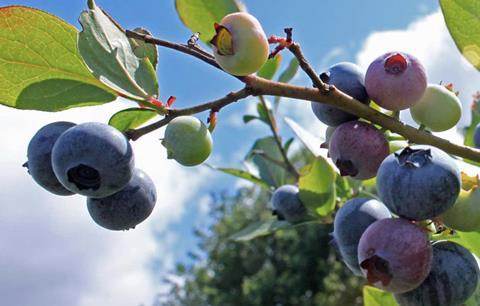Carlos Esteve tells Fruitnet why the company’s exclusive new varieties are an attractive option for European retailers
One of Spain’s leading soft fruit companies is making a play for the autumn blueberry window to offer European customers a fresher and more sustainable alternative to berries imported from the Southern Hemisphere.

Huelva-based Onubafruit’s extra-early blueberry programme was born from a multi-year project to develop proprietary varieties that could be harvested when European supply is at its lowest. The result was suite of new varieties covering the first part of the season which includes – but is not limited to – Demba, Dana, Selma and Aila.
Commercial director Carlos Esteve says the company is very happy with how the programme is progressing. “Our new exclusive varieties are not only helping us to bring forward the start of our season but also to renew our plant material more generally since they cover more than just the extra-early window,” he tells Fruitnet.
“To give you an idea of the numbers, in 2021/22 we did not have any new material in the ground but for the 2023/24 campaign we have planted 5m plants among our partners.”
Spain’s blueberry season typically starts in December/January, with peak supply running from April till June. Onubafruit is one of Huelva’s biggest growers, producing around 15,000 tonnes of blueberries from a planted area of 1,100ha.
With its new varieties, Onubafruit can now harvest small volumes from September, but continuous production is at present only available from late November onwards. As young plantations mature and others are replaced with the new varieties, production volumes are set to ramp up significantly.
“Being able to supply blueberries in that window is a great advantage since it allows us to provide a fresher and more sustainable product while also offer more flexibility to the customer,” Esteve continues. “For all these reasons, retailers are eager for availability to increase.”
This season, Onubafruit is hoping to capitalise on the sharp drop in Peruvian production due to the high temperatures caused by El Niño – although as Esteve points out, Spain is experiencing its own climatic challenges right now.
“The significant decline in Peruvian production is greatly affecting the blueberry market and this is having consequences for everyone in the industry. There is no doubt that less pressure on supply helps find space for our product, but it looks like we may have to revise our planned production downwards for this campaign because of the tough conditions we’re enduring,” he says.
Looking ahead, the cornerstones of Onubafruit’s blueberry expansion strategy will continue to be the development of new varieties that raise the quality bar and extend the company’s harvest window.
“We have tried to lengthen our production period, especially in the early part of the season, with varieties with no or low requirement for chilling hours,” Esteve says. “More recently, in the past year, we’ve also opened a new avenue of research to develop plant material with greater cold requirements.”



